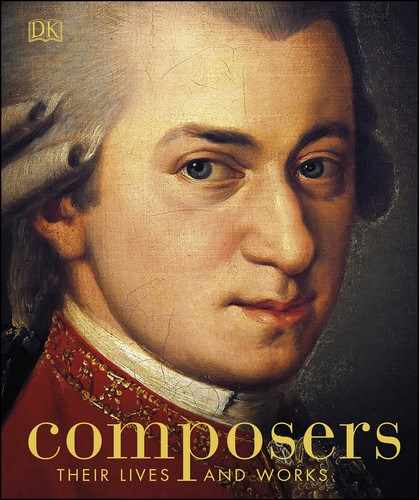Michael Tippett
1905–1998, BRITISH
A slow and meticulous musical craftsman, Tippett achieved recognition comparatively late in life, but soon came to be regarded as one of the foremost British composers of the latter half of the 20th century.

MICHAEL TIPPETT, 1973
Tippett is pictured here at his piano in his late sixties, three years after he split up with his partner, Karl Hawker. It was also around this time that he moved away from an experimental period in his music to resume the lyricism that had characterized his earlier work. Despite the composer’s long-held antiestablishment beliefs, his significant contribution to music was honored in 1966 with a knighthood and in 1983 with the prestigious Order of Merit.
IN CONTEXT
Morley College
Founded in the 1880s, Morley College is a famous adult education center in Waterloo in central London. It originally occupied the premises of a music hall, which was taken over by philanthropist Emma Cons to provide more edifying entertainment and educational “penny lectures.” Thanks to an endowment from statesman Samuel Morley (1809–1886), it formally became the Morley Memorial College for Working Men and Women, in separate premises from the theater, in 1889. The music department of the college in particular flourished under the directorship of Gustav Holst between 1907 and 1924, and later Michael Tippett (1940–1951).

SAMUEL MORLEY, INDUSTRIALIST AND POLITICIAN, 1882
Born into an upper-middle-class family, Michael Tippett was brought up in a liberal atmosphere by his freethinking parents. Soon after his birth, the family moved from Middlesex to Suffolk. Michael and his brother were privately educated by tutors at their home until 1914, when he was sent to a boarding school in Devon, and later gained a scholarship to Fettes College in Edinburgh.
This was, however, no place for a sensitive boy like Michael, who in 1920 admitted he had formed a romantic relationship with another boy, and was transferred to Stamford School in Lincolnshire, which had a reputation for musical education. Here he began to flourish—but as his confidence improved, he became outspoken in his left-leaning and atheistic views and was asked to leave in 1922.

FETTES COLLEGE, EDINBURGH
Tippett was a boarder at the school from 1918 to 1920—he was a member of the choir and also studied piano and the pipe organ. The school’s grandiose main building, c. 1870, is shown here.
“ Music is a performance and needs the audience. ”
MICHAEL TIPPETT
A period of development
Tippett enrolled at the Royal College of Music the following year, graduating with a music degree in 1928. His attempts at composing were unsatisfactory, so he returned to take a course in counterpoint, after which he felt ready to begin his career in music. To support his composing, he took a job as conductor of the South London Orchestra, a publicly funded ensemble for unemployed musicians. It was a time of important personal as well as musical development: he began a serious relationship with Wilfred Franks, to whom he dedicated his first mature composition, the String Quartet No. 1; he also became more politically active, briefly joining the Communist Party.
However, Tippett’s career was interrupted by a crisis of confidence. He was devastated by the end of his relationship with Franks in 1938 and struggling to come to terms with his homosexuality. Doubting his worth as a composer, he embarked on a course of Jungian psychoanalysis. This form of therapy gave him the confidence, and the inspiration, to persevere with his composition free from anxiety over his sexuality. The first work to emerge from this period was the oratorio A Child of Our Time.

KING PRIAM, 2014
The English Touring Opera company is shown here in its production of Michael Tippett’s King Priam, directed by James Conway and conducted by Michael Rosewell, at the Linbury Studio Theatre, Royal Opera House, London, in 2014.
Taking a stand
After the outbreak of World War II, Tippett was appointed as director of music at Morley College, London (see box). A lifelong pacifist, he registered as a conscientious objector; in 1942, after refusing to take on civilian duties aiding the war effort, he was taken to court and imprisoned for three months. Following the success of A Child of Our Time at its premiere in 1944, however, his pacifism, socialism, and homosexuality were overlooked, and his status so established that he was invited to present a series of talks on BBC radio.
During the 1950s, Tippett lived in Wadhurst, Sussex and in 1960 moved with his partner, Karl Hawker, to Corsham in Wiltshire, where he began to write in an experimental and dissonant style, later influenced by the jazz and blues he had heard on a trip to the US in 1965. After his breakup with Hawker in 1970, he returned to his former lyricism. Despite health issues in the 1980s and early 1990s, he traveled widely, absorbing different musical influences.
Tippett was held in remarkably high esteem, being awarded several national honors. He died in London in 1998, aged 93, following a stroke.
